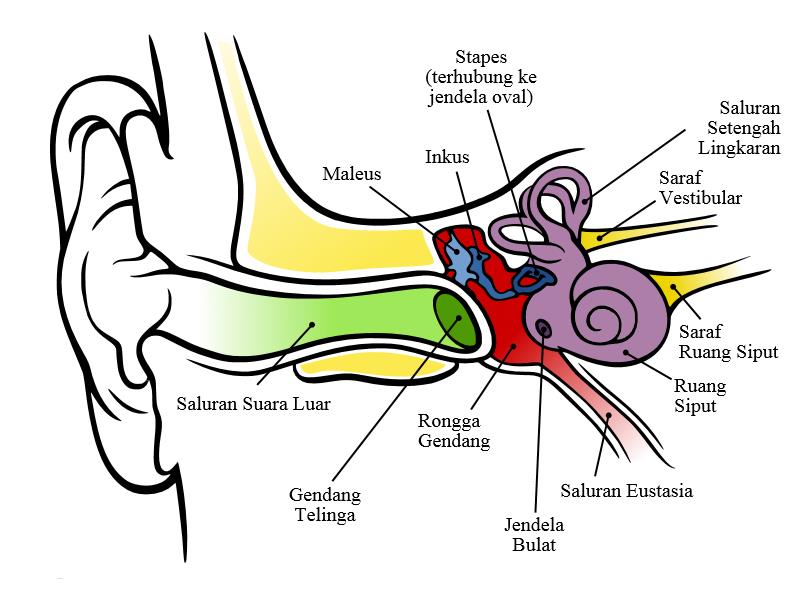Sensorineural hearing loss in the elderly (Presbycusis) occurs due to degeneration process of the organ of hearing. This hearing disorder is progressive and permanent in nature. It is estimated that about 30% of elderly of 65 to 75 years and 50% of over 75 years old are having hearing problem.
Factors causing Presbycusis is not fully identified. However, a few factors may lead to this condition, such as age, hypertension, diabetes mellitus and prolonged exposure to noise. Signs of hearing loss at this stage include difficulty to hear and understand speech, which may lead to emotional distress along with disrupted communication between the person and others.
 |
|
URL : commons.wikimedia/org/wiki/File:Anatomi_Telinga_Manusia.svg
|
Aural rehabilitation such as hearing aid and cochlear implant are able to help elderly with hearing problem to hear better. Nonetheless, communication strategy with the person also needs to be stressed to enhance their hearing ability and help them to communicate more effectively, especially in noisy environment. Among communication strategies that can be applied to elderly with hearing problem are:
Gain attention before starting conversation
Start conversation with the individual by gaining the person’s attention to inform that we are talking to the person. Ensure the topic of conversation is clear, and then talk slowly by facing the person. Visual cues such as hand signal may enable the person to be more focused and helping in understanding intended message of conversation.
Talk clearly and naturally
While talking, talk naturally in slower pace than usual by using pauses. Do not shout. This method may help the elderly to hear and understand conversation better and more effective. Each delivered message will be clearer as well as making it easier for the person to process each speech sound heard.
Reconstruct sentences
If communication is disrupted, repeat delivered message slowly. Otherwise, reconstruct sentences to enable it to be easier to be understood. Avoid talking in complex sentences.
Gain feedback
Gain feedback from the elderly with hearing problem to ensure the person truly understand intended delivered message.
Good listening environment
Most elderly with hearing impairment encounter difficulty to understand conversation in noisy environment. That is why we need to ensure that their listening environment is clear from noise source or other sound that may hinder their attention to hear.
We should be positioned in front of the elderly when talking to them, as well as being near to ensure that visual cues such as lip movement of the speaker is visible and helpful to listener to understand speech.
Bear in mind that our goal is to make communication easier, not invoke negative impression or feeling among elderly with hearing impairment. If our goal is not achievable through oral communication, non-oral communication such as handwriting or signaling may be used to help them to understand intended message.
| Last Reviewed | : | 10 October 2016 |
| Writer | : | Zuria bt. Abd Shukor |
| Translator | : | Isabella Laus |
| Accreditor | : | Siti Suriani bt. Che Hussin |







